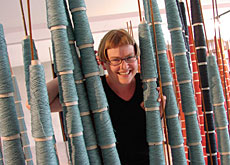Lantal textiles fly the world

Fabric and carpets from a company in Langenthal, canton Bern, travel around the world every day. And some pretty influential names use products from Lantal Textiles.
President Bush sits on Lantal fabric every time he flies in Air Force One. And Britain’s Queen Elizabeth walks on the company’s carpet in her aircraft.
Lantal has carved out a niche for itself in producing textiles for what can best be described as “moving interiors”.
“We are specialists in transportation textiles – fabrics for the seats of aircraft, buses, trains and trams, and carpets for the same industry,” company chairman Urs Baumann told swissinfo.
“We are certainly the world leader in the industry. We have a 55-60 per cent fabric market share and about 30 per cent share in carpets,” he added.
300 airlines
Lantal supplies all the world’s major aircraft manufacturers, as well as more than 300 airlines, with seat upholstery fabrics, wall coverings, carpets, fine leather and pleated curtains.
Founded in 1886 by Baumann’s grandfather, the company started life weaving linen, which was used in the production of Emmental cheese. Langenthal is at the gateway to the Emmental region.
Lantal entered the aviation world with KLM of the Netherlands quite by chance in the 1950s.
“Our agent wanted to sell fabrics for office furniture but they [KLM] didn’t want to buy that… just fabrics for aircraft. That was the beginning of our activity in the aviation industry,” Baumann recalls.
Fabric for aircraft upholstery has to meet strict safety requirements, particularly concerning flammability. That is one reason why Lantal has its own testing stations in Switzerland and the United States, which are certified by the relevant aviation authorities.
Aviation crisis
It’s not surprising that company sales have been hit over the past two years with the crisis in the aviation business. But new company chief executive Urs Rickenbacher says that revenues were not hit as hard as had been expected.
“We know that the crisis is here but the airlines are trying to attract customers as best they can. They try to have new designs in their cabins, which means that we’re working closely with quite a lot of airlines,” he explained.
“Not many are buying new aircraft but most are refurbishing their planes and that is a huge chance for us,” Rickenbacher added.
The company also wants to boost business by tapping into other markets. It wants to develop the potential of supplying to cruise ship lines, particularly at the top end in the United States.
And it is not sitting idly by when it comes to innovation. Earlier this year, it presented a new aircraft seat that could revolutionise the industry.
Pneumatic textiles
Developed in collaboration with a design team called Prospective Concepts, the seat features pneumatic textiles that offer improvements in terms of weight, comfort, potential savings and safety.
Basically, the seat includes air cushions instead of standard foam.
“We thought it would be a good idea to increase the comfort of customers, to decrease the weight and also to take away some of the flammability problems in an aircraft,” Baumann said.
“With the new seat, all three objectives have been reached. At the moment we have a prototype, which is being very well accepted by the industry,” he added.
The company claims that depending on the aircraft type, the seat can save up to 1.5 tons in weight. And Lantal adds that taking a wide-body plane as an example, it could save up to $1 million (SFr1.38 million) on jet fuel a year.
“Intelligent carpet”
Baumann has other ideas he wants to develop, including “intelligent carpet” that could direct people from one place to another. But he doesn’t want to give too many secrets away.
At the age of 63, he’s also content that succession at his family business has now been solved with Rickenbacher, who is due to take over 51 per cent of the company’s share capital next year.
“We wanted to find an entrepreneur – not a manager – with the same spirit of business. We took about three years and found Urs Rickenbacher,” he explained.
“I’m very proud to be able to have a successor who wants to be an entrepreneur and also wants to take all the risks as an entrepreneur.”
Baumann is philosophical about the change and is convinced he has made the right choice.
“Lantal is totally my lifeblood, naturally. I live for it and love it tremendously,” he told swissinfo.
“That’s why it’s extremely important that you find somebody who is almost like a son to you, that you are proud to give it to him and that’s the case,” he added.
swissinfo, Robert Brookes in Langenthal
Lantal Textiles was founded in 1886 and in its early days wove linen for use in the production of Emmental cheese.
Two out of three airline seats are covered by Lantal fabric.
The firm supplies more than 300 of the world’s airlines.
Lantal textiles can be found in aircraft, buses, trains, trams and ships.
It entered the aviation market by chance in the 1950s.
The crisis in the airline industry has led to a downturn in sales but Lantal says the situation is not as bad as had been expected.
Airlines might not be buying new aircraft but many are refurbishing their fleets to attract customers.

In compliance with the JTI standards
More: SWI swissinfo.ch certified by the Journalism Trust Initiative



You can find an overview of ongoing debates with our journalists here. Please join us!
If you want to start a conversation about a topic raised in this article or want to report factual errors, email us at english@swissinfo.ch.